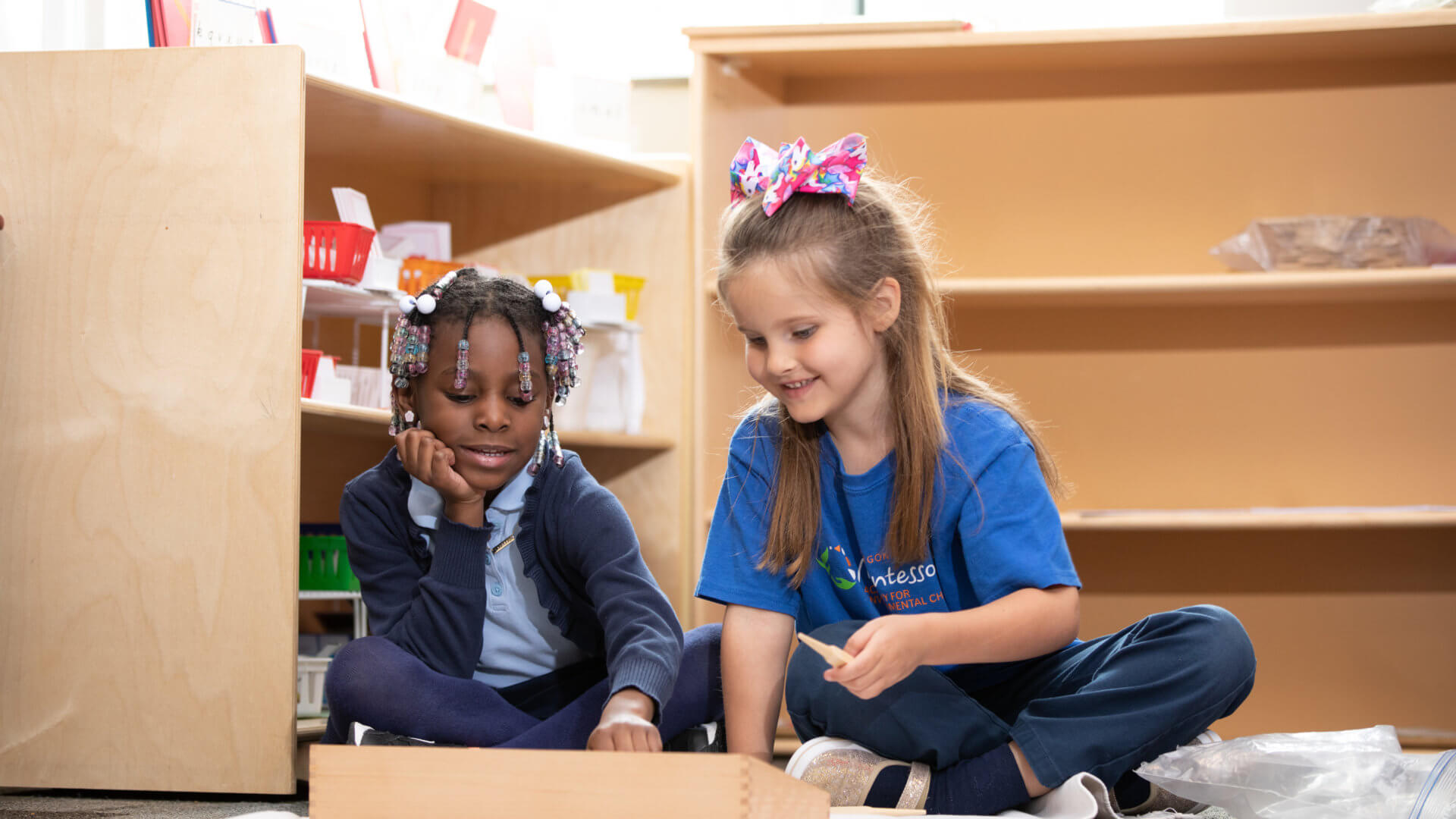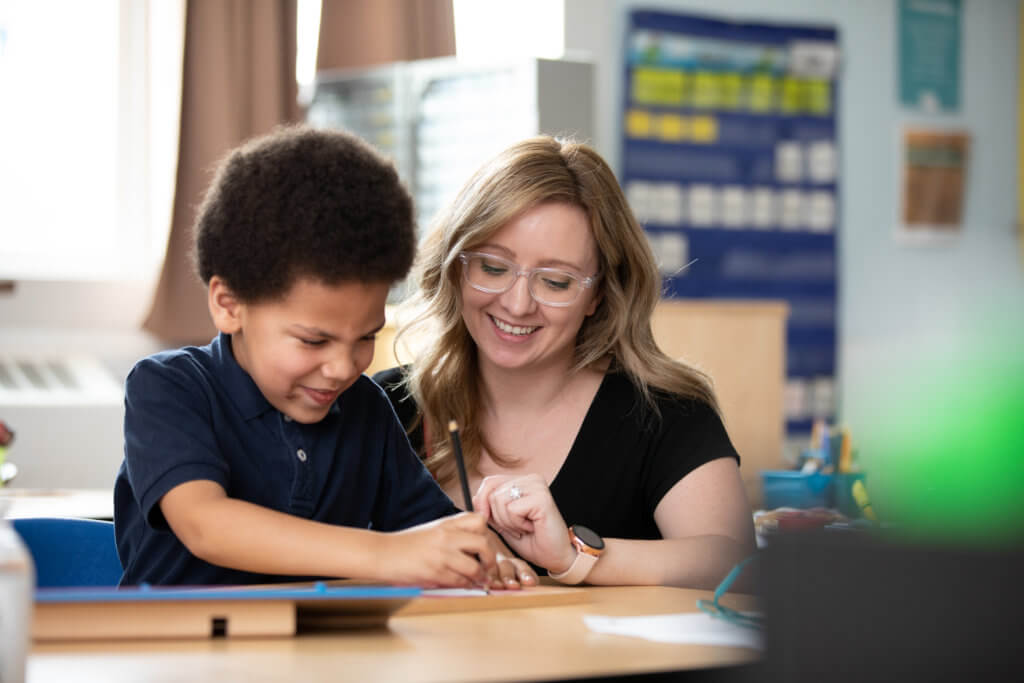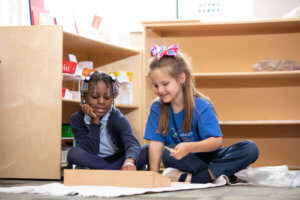What comes to mind when you picture a school classroom? If you’re like most people, you see what you experienced as a child – row upon row of desks, textbooks, and a teacher at the front lecturing or giving instructions.
It turns out, though, that this traditional model isn’t the only way to teach. In fact, there are several other proposed methods, including the Montessori method.
As soon as you walk into a Montessori classroom, you notice the difference. Children do not sit in rows, and the teacher is seen as a guide to the learning process. Instead, they work in small groups, often following their own interests. What’s more, the classroom itself is deeply engaging. There’s more to the learning experience than just taking notes from a whiteboard.
What Is Montessori Education?
Montessori education was founded by Dr. Maria Montessori, a renowned Italian physician who pioneered a new approach to educating children. She saw that each child was different and progressed through subject matter at varying speeds. Some students could master subjects in an afternoon while others required a week or more.
Dr. Montessori advocated for a self-paced, student-led, prepared learning environment. She firmly believed that such pedagogical environments fostered characteristics that thriving societies needed – independence, accountability, and public-spiritedness.
Given the freedom to explore the world on their own terms, Dr. Montessori saw how children following her methods asked more probing questions and explored topics more deeply.
As she refined the approach, she saw how it led children to behave as if they were accountable members of the community with a degree of ownership over it, not just passive recipients of textbook information.
The result was greater levels of critical thinking, an increased desire to work collaboratively, and even higher integrity – the marrying of stated values with behaviors and actions.
Montessori places a high value on all aspects of the child–their intellectual, emotional, social, physical and moral development and works with the child to develop their own plans for work, allowing them to make choices while guiding them in exploring new interests and talents.
The Montessori classroom looks very different from a traditional classroom; students can move around the room more freely, spend time on a project with peers, or curl up with a great book in a reading corner.
Children love the peaceful classroom setting and develop the interpersonal skills necessary to maintain the learning environment.
The Montessori Method is recognized all over the world for having inspired some of the greatest minds of the modern world.
What Are The Features Of Montessori Education?
Montessori education allows children to create their own learning paths, building on student interests to create a community of knowledge.
The multi-age format allows children to learn without competition–accelerating or taking their time according to their developmental stage and building a classroom community that feels like family.
Montessori schools also make substantial use of hands-on learning materials. When you get to learn about botany by looking at leaf samples or learn about your favorite historical figure by dressing up as them, learning is engaging and fun.
Montessori provides experiences for students to learn. Learning doesn’t just come from lectures or listening, learning comes from doing and experiencing the world around them.
Dr. Montessori believed that children learn best when sensing the world around them.
Freedom of choice is another characteristic of Montessori education. Choice is embedded into the classroom culture, each child has a choice over their work partners, when they learn, what they work on, where they sit, and even the food they eat. Freedom, the theory goes, endows children with responsibility, allowing them to act independently in a relatively unstructured environment, similar to what they might experience in the adult world of work.
Other features of Montessori education include:
- Repetition: Teachers let children continue learning about a specific subject for as long as the child deems necessary, even if what they are doing appears repetitive to an adult learner.
- Independence: Montessori teachers encourage children to learn independently. In many cases, they will step back and allow the child to solve a problem, such as tying their shoelaces or solving a math equation, resisting the temptation to step in and do it for them.
- Respect: Even though children are young and inexperienced, schools still value them deeply, maintaining their dignity and respect at all times. The Montessori view of the child is that they have a particular significance in both society and humanity as a whole. Children are going through an important, identity-defining process, but rather going through an important, identity-defining process that will fully emerge once they grow up.
- Teacher as Guide: The teacher in a Montessori school is defined as a guide somebody who can be a role model, resource, facilitator, observer, presenter, and designer of the environment. Rather than following a general curriculum, the guide sets it themselves.
Conclusion
Montessori education is radically different from conventional approaches. Forward-thinking parents often make it their school choice for its unique ability to create confident, independent, and well-rounded children.
Choice Schools is a nationally recognized education service provider committed to partnering with school communities across the state of Michigan, empowering and equipping them to fulfill their unique mission. Among our diverse selection of great schools, there are many that employ a Montessori-style education.
If you’re interested in learning more about working at a Montessori school or want to learn more about the Montessori schools in our network, please visit our website or contact us to get started.



